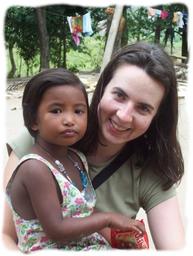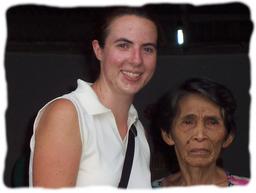Medical School Application EssaysUse this template to start an empty web page.   Why do I want to become a physician?Secondary Application Essay
2007
Jennifer Boyd, PharmD
Working in healthcare is not just my job; it is my ministry and calling. As a young girl, I fondly remember walking the hallways and cafeterias of hospitals with my father, a hospital administrator. As he called out greetings to physicians and staff, I fell in love with the hustle and bustle of healthcare. By high school I was a hospital teen volunteer; in college I was a pharmacy technician and pharmacy intern. Since that time I've graduated from pharmacy school and worked and served in many different healthcare settings. These experiences have sharpened my clinical skills and convinced me to expand my healthcare role to that of a physician.
Much of my decision to pursue medical school stems from a desire to spend more time in direct patient care. As a clinical pharmacist working in various areas of the hospital, I find myself seeking out opportunities to interact with patients. In our pharmacist-run anticoagulation clinic I'm blessed with the opportunity to build relationships with patients and help coordinate their care. I frequently cover our neonatal/pediatric pharmacy satellite and enjoy working with nurses to find creative ways of administering medications to pediatric patients. My favorite geriatric patient was Mr. D, an orthopedic surgery patient who came up with a new medication question every day so I would visit his room and listen to grandkid stories. I enjoy constant interaction with patients at our free community clinic, making volunteer work there enjoyable. As a future physician, I look forward to more opportunities for direct patient care.
Another motivation for becoming a physician is my passion for benevolent healthcare. In addition to volunteering at a local free clinic, I've had the privilege of working with church and medical teams in poor villages throughout the world. My experiences include drinking warm goat's milk with sheepherders in Siberia, tasting clean water from a new well in Zambia, dispensing creams to treat fungal infections in Cameroon, and using plastic bottles and colored water to teach about diarrhea and dehydration in the Philippines. I completed a "mission medic" training program to study common diseases in low-income nations and then spent eight months in rural areas of the Philippines providing community education and basic healthcare. I enjoy using my pharmacy background and credentials in medical ministry, but I find my degree limiting as I look toward the future. My long-term mission goals are (1) to establish a free clinic for at-risk, uninsured patients in an Idaho community, (2) to train indigenous pastors, missionaries, and other volunteers to be health workers in villages of developing nations, and (3) to help update and develop protocols and medical resources for village healthcare. To effectively pursue these goals, I need more medical background and a medical degree that is recognized in the United States and abroad. I'm excited to complete medical school and obtain the knowledge and credentials required to fulfill these dreams.
Serev and his family spent ten years in refugee camps before coming to the United States. I was his volunteer English tutor. One day I told him about my experiences in the Philippines as a medical missionary. I described sitting in a hot, humid hospital that reeked of body odor and human excrement because there was no running water. I held a premature baby who probably did not survive because there were no modern neonatal services available. The disparity between this environment and the state-of-the-art neonatal intensive care unit where I work in Boise was overwhelming. I told Serev that I felt angry about the wealth of the United States and the poverty of the rural Philippines. In broken English, Serev told me, "Do not be angry. America good! Be happy you live here. Love people. Share your blessing." His words still echo in my head. Love people. Share your blessing. As I expand my healthcare role to that of a physician, I will seek opportunities to "love people" through direct patient care, and obtain medical credentials that will let me "share my blessing" with those in need.
|
|  Why am I applying for medical school? | Application Essay
2007
Jennifer Boyd, PharmD
Medical professionals have a unique calling to serve others. As a pharmacist, I have opportunities to serve my patients on a daily basis, but often face limitations. My dreams are to not just modify anticoagulation therapy per protocol but develop overall treatment regimens, not just volunteer for a local free clinic but develop a new one in a new community, not just lead short term medical outreaches but develop training programs for long-term health workers worldwide, not just raise awareness about the lack of medical teaching resources in the third world but develop village medicine textbooks and treatment protocols. As a medical doctor, I plan to transform these dreams into reality.
My name is Jennifer Boyd. I grew up in a small town in northern Idaho and have been blessed to live most of my life in this beautiful state. I am a clinical pharmacist at Saint Alphonsus in Boise, enjoying a diverse and rewarding job within an integrated healthcare team. This position comes with a six-figure income, health insurance, and a retirement plan. Why would I choose medical school now? Why would I take the MCAT without a review course and before my second semester of physics? Why would I invest the next seven years of my life in medical school?
I enjoy direct patient care, my pharmacy training is a good complement to family medicine, and in this flexible stage of life I am able to devote myself to continued medical training. However, the real reason I am pursuing a medical degree is to obtain a physician's knowledge, skills, and credentials to better meet the healthcare needs of underserved local and global communities.
As a clinical pharmacist, one of my favorite roles is direct patient care and disease state management. Recently, a patient at our pharmacist-run anticoagulation clinic called to report black, tarry stools. His CBC revealed a large drop in hemoglobin and hematocrit, he had a significant risk of clotting (two prior pulmonary embolisms), his referring physician was out of town, and our clinic protocol did not cover this circumstance. Dozens of phone calls and an emergency room visit later, we received an official order to hold his anticoagulation therapy. As a pharmacist, I am limited to practicing under another clinician's prescribing authority. I look forward to a career in family practice where I can combine my pharmacy and medical training to treat whole patients, as opposed to individual disease states.
As a volunteer pharmacist at a local free clinic, I am usually the last clinician to see a patient before they leave. It is very common to hear "I am so grateful for this clinic. Why isn't there one like it in "Smithville" where my relatives live?" As a physician I can provide the leadership and credentials needed to establish new clinics.
Short-term volunteer medical outreaches make a significant difference in destitute villages around the world. On one outreach to Bafut, Cameroon I helped my team use antibiotics to cure infections, eyeglasses to restore sight, and dental procedures to cure tooth pain. The thrill of this experience launched me into dozens of similar outreaches. Still, I want to make a more significant impact. What about the child who develops an infection three days after the team leaves? What about the baby who dies of dehydration because there is no village educator and his mother withholds fluids to stop his diarrhea? I have the materials, training, and desire to train village health workers and develop health education programs within villages, but my current medical credentials are not recognized by most foreign governments.
While working with Mercy in Action, I led medic teams into remote villages of the Philippines. When a physician was not available, we worked under protocols like the Integrated Management of Childhood Illnesses developed by the World Health Organization and UNICEF. This protocol let basic health workers safely treat respiratory infections, dehydration, and malaria without a physician referral (unavailable in this setting). I was heartened by the success of this program and look forward to using my medical training to update training materials and develop similar programs throughout the world.
In the tiny village of Bogo, CPG Island, Philippines, I led a medical outreach on November 12, 2006. My last patient on this long, hot day was an elderly, malnourished woman who complained of blurry vision, weight loss, and extreme pain. Weary after months of working in extremely poor villages, I explained that there was very little I could do for her. I offered her enough anti-inflammatories and multiple vitamins to last a few weeks and asked if she would like me to pray with her. As the translator related my question, her face transformed into a huge, toothless grin. Tears streamed down her cheeks as she squeezed my hands and spoke in her native tongue. "Thank you," she said. "Thank you for listening to me. Thank you for caring for me and for my people. I would very much like to pray with you." Moments like this reaffirm my commitment to medical service. Challenges in medicine are daunting, but the rewards are great.
|  |
|
|
|
|
|

